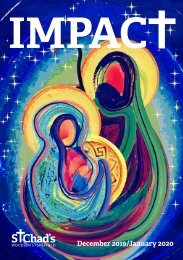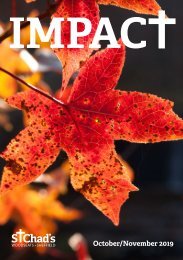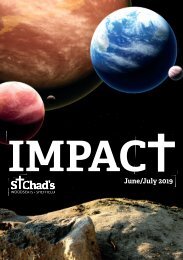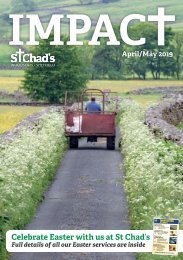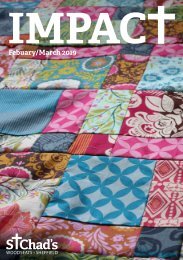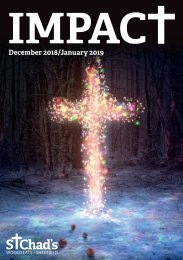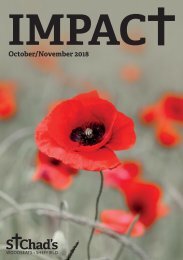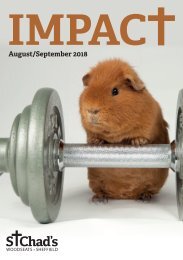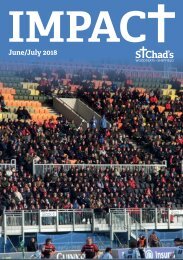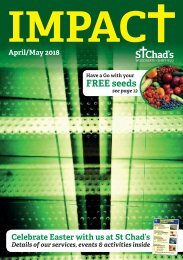2011-02
2011-02
2011-02
Create successful ePaper yourself
Turn your PDF publications into a flip-book with our unique Google optimized e-Paper software.
St Chads Church, Linden Avenue, Woodseats<br />
email: office@stchads.org<br />
Church Offices: 15 Camping Lane, Sheffield S8 0GB Page 1 website: www.stchads.org<br />
Tel: (0114) 274 5086
St Chads Church, Linden Avenue, Woodseats<br />
email: office@stchads.org<br />
Church Offices: 15 Camping Lane, Sheffield S8 0GB Page 2 website: www.stchads.org<br />
Tel: (0114) 274 5086
Ever since I can remember I have loved reading. As a six year<br />
old my delight was Enid Blyton’s Famous Five and Secret<br />
Seven. As a teenager I became obsessed with science fiction<br />
and thrillers, looking forward to my monthly visit to the local<br />
library from where I would return laden down with hardback<br />
fiction. At university I was introduced to some of the classics of<br />
English and European literature, sometimes curling up for hours<br />
with a book, oblivious to the world outside. Whenever I move to<br />
a new house, before I think of anything else, I plan where the<br />
bookshelves are going and what books are going on it. The<br />
technical word for someone like me is a bibliophile (meaning<br />
book lover). I think biblioholic might be more accurate!<br />
But the world of books is changing fast. Second-hand<br />
bookshops are closing down fast as on-line retailers like Amazon slash the<br />
price of buying books. E-readers such as Amazon’s Kindle, the i-pad or the<br />
Sony equivalent are changing the way that we think about reading. The time<br />
may well come when the only books that exist are antiquarian – relics of the<br />
pre-IT age – and can only be bought from specialist retailers.<br />
I have one e-book and that is the Bible. I keep it on my handheld electronic<br />
diary (you see I’m not a complete dinosaur when it comes to technology). For<br />
a book the size of the Bible electronic format is very helpful. I can find verses<br />
and key words very quickly and the whole thing handily fits into my pocket.<br />
The Bible was one of the first books to be produced in electronic format, which<br />
isn’t surprising because the Bible has often been at the forefront of changes in<br />
reading habits and technology. It began life as scrolls carefully carried across<br />
the Roman world to the tiny scattered churches that met in Rome, Corinth,<br />
Ephesus and other towns. In the Middle Ages monks across Europe would<br />
spend years copying and decorating Bibles for use in worship – the<br />
Lindesfarne Gospels being perhaps the most famous. With the advent of the<br />
printing press the Bible suddenly became mass-produced and with mass<br />
production came the desire to allow the masses to read it. The age of<br />
translation had begun.<br />
This year sees the 400 th anniversary of the Authorised Version, or the King<br />
James Version, of the Bible. Along with many other churches in Britain we will<br />
be celebrating this anniversary by taking a fresh look at the Bible and<br />
encouraging each other to read it with new eyes. I believe the Bible remains<br />
the most amazing book ever published. It is not only the foundation document<br />
of the Christian faith, it also lies at the heart of British culture – political,<br />
literary, artistic and linguistic. In <strong>2011</strong> see if you can get hold of a Bible (you<br />
might have one knocking around the house somewhere) and read some of it –<br />
I think the Gospel of Luke is a good place to start. You might be surprised at<br />
how fresh some it’s ancient words seem to you.<br />
Rev Toby Hole<br />
Vicar<br />
St Chad’s Church<br />
Woodseats<br />
St Chads Church, Linden Avenue, Woodseats<br />
email: office@stchads.org<br />
Church Offices: 15 Camping Lane, Sheffield S8 0GB Page 3 website: www.stchads.org<br />
Tel: (0114) 274 5086
Bright Spark Electrical<br />
All types of electrical work<br />
Part P qualified<br />
Burglar alarms<br />
Telephone sockets<br />
Computer tuition, setup/<br />
repair and upgrades.<br />
Malcolm Holmes<br />
77 Holmhirst Road<br />
Sheffield S8 0GW<br />
Tel: 0114 2490889<br />
Mob:07966 141780<br />
Email: msholmes1@yahoo.com<br />
St Chads Church, Linden Avenue, Woodseats<br />
email: office@stchads.org<br />
Church Offices: 15 Camping Lane, Sheffield S8 0GB Page 4 website: www.stchads.org<br />
Tel: (0114) 274 5086
What do<br />
you<br />
get if<br />
you<br />
cross<br />
a pig<br />
and a<br />
telephone?<br />
When is an English<br />
teacher like a judge?<br />
When she hands out<br />
long sentences.<br />
Crackling on the line!<br />
Did you hear<br />
about the<br />
undertaker<br />
who buried<br />
someone in the<br />
wrong place?<br />
He was sacked<br />
for making a<br />
grave mistake.<br />
How does a<br />
barber cut the<br />
moon's hair?<br />
Eclipse it!<br />
A mother was teaching her<br />
three-year-old daughter The<br />
Lord's Prayer.<br />
For several evenings at<br />
bedtime, she repeated it after<br />
her mother.<br />
One night she said she<br />
was ready to pray it on her<br />
own. The mother listened<br />
with pride, as she<br />
carefully said each word<br />
right up to the end..."And<br />
lead us not into temptation",<br />
she prayed, "but deliver us<br />
some e-mail, Amen."<br />
What did the cat<br />
do after he had<br />
eaten some<br />
cheese?<br />
He waited by a<br />
mouse hole with<br />
baited breath!<br />
Who was the first<br />
underwater spy?<br />
James Pond!<br />
Why did the bus<br />
stop?<br />
It saw the zebra<br />
crossing!<br />
St Chads Church, Linden Avenue, Woodseats<br />
email: office@stchads.org<br />
Church Offices: 15 Camping Lane, Sheffield S8 0GB Page 5 website: www.stchads.org<br />
Tel: (0114) 274 5086
Send details of your event to impact@stchads.org or write to: Impact,<br />
St Chad’s Church Offices, 15 Camping Lane, Sheffield S8 0GB.<br />
Health Walks<br />
Mondays – 10am: Graves Park.<br />
Meet at the Animal Farm car park;<br />
Tuesdays – 10.30am: Ecclesall<br />
Woods. Meet at Abbeydale<br />
Industrial Hamlet;<br />
Thursdays – 10.30am:<br />
Lowedges. Meet at the Community<br />
Wing, Lowedges Junior School.<br />
Call 0114 203 9337.<br />
National Council for Divorced,<br />
Single and Widowed<br />
Tuesdays 8-11pm<br />
Norton Country Club<br />
Club offering friendship and social<br />
activities.<br />
Call Magdalen on 0114<br />
2394326.<br />
January 30 - February 5<br />
AEGON British Tennis Tour<br />
Graves Tennis and Leisure Centre<br />
World ranked players compete<br />
alongside local Sheffield players.<br />
Call 0114 283 9900.<br />
February 5<br />
Book Sale<br />
36 Crawshaw Grove, Beauchief<br />
10am-12pm<br />
Good quality second-hand books<br />
for sale in aid of the Alzheimer’s<br />
Society. Donations of paperback<br />
novels or biographies in good<br />
condition are welcome (but not<br />
larger books due to space<br />
limitations).<br />
February 5<br />
Free Environmental Activities<br />
Millhouses Park<br />
10.30am-12.30pm<br />
Obstacle course and stream<br />
dipping activities for 8 - 13 year<br />
olds.<br />
Call 0114 263 4335.<br />
February 8-12<br />
Jamaica Inn<br />
Ecclesall All Saints Church Hall<br />
7.30pm<br />
A play presented by Ecclesall<br />
Theatre Company. Tickets: £5.<br />
Call 0114 230 8842.<br />
February 12<br />
Free Environmental Activities<br />
Millhouses Park<br />
1.30-3.30pm<br />
Nature quiz trail, stream dipping<br />
and bug hunting activities for 8 - 13<br />
year olds.<br />
Call 0114 263 4335.<br />
February 12<br />
Free Environmental Activities<br />
Ecclesall Woods Sawmill<br />
10.30am-12.30pm<br />
Nature quiz trail, stream dipping<br />
and bug hunting activities for 8 - 13<br />
year olds.<br />
Call 0114 235 6348.<br />
February 20<br />
Why Not Try A Bike<br />
Greenhil Park<br />
10am-2pm<br />
Rediscover your cycling skills in<br />
Greenhill Park. The rangers will<br />
provide a bike, helmet and<br />
instruction. Meet at the Bowls<br />
Pavilion, Greenhill Park.<br />
Booking is essential.<br />
Call 0114 283 9195.<br />
Beauchief Abbey holds a variety<br />
of services and anyone is<br />
welcome to attend. For more<br />
details see the Abbey notice<br />
board.<br />
St Chads Church, Linden Avenue, Woodseats<br />
email: office@stchads.org<br />
Church Offices: 15 Camping Lane, Sheffield S8 0GB Page 6 website: www.stchads.org<br />
Tel: (0114) 274 5086
February 21<br />
Half-term Environmental<br />
Activities<br />
Meersbrook Park Walled Garden<br />
10.30am-12.30pm<br />
Make bird feeders, bird boxes and<br />
bird ID. Activities for 8-13 year olds.<br />
Call 0114 263 4335.<br />
February 27<br />
Wild Designs: Pyrography<br />
Ecclesall Woods Sawmill<br />
11am-2pm<br />
Learn how to create designs in<br />
wood using a pyrograph (heated<br />
needle). Booking is essential.<br />
Call 0114 283 9195.<br />
March 6<br />
Junk Boat Race<br />
Millhouses Park<br />
11am<br />
Using your engineering skills, some<br />
glue and a bag of junk, build a<br />
boat and race it on Millhouses<br />
lake. Meet at Millhouses Park<br />
Cafe. Booking is essential.<br />
Call 0114 283 9195.<br />
March 20<br />
Step Out from Greenhill Park<br />
Greenhill Park<br />
10am<br />
Join the rangers on an<br />
exploration of the footpaths from<br />
the park into the countryside.<br />
Meet at the Bowls Pavilion.<br />
Call 0114 283 9195.<br />
March 27<br />
Grass Sledging<br />
Meersbrook Park<br />
11am-1pm<br />
Sledge the slopes of Meersbrook<br />
Park with the rangers.<br />
Call 0114 283 9195.<br />
St Chads Church, Linden Avenue, Woodseats<br />
email: office@stchads.org<br />
Church Offices: 15 Camping Lane, Sheffield S8 0GB Page 7 website: www.stchads.org<br />
Tel: (0114) 274 5086
A<br />
bookmark is usually a piece of<br />
paper or card, or even plastic<br />
or metal which is used to keep<br />
the reader’s place in a book, or<br />
the point at which one has stopped<br />
reading. Bookmarks were used<br />
throughout the medieval period,<br />
consisting usually of a small parchment<br />
strip attached to the edge of folio (or a<br />
piece of cord attached to headband).<br />
As the first printed books were quite<br />
rare and valuable, it was determined<br />
early on that something was needed<br />
to mark one's place in a book without<br />
causing its pages any harm. Some of<br />
the earliest bookmarks were used at<br />
the end of the sixteenth century, and<br />
Queen Elizabeth I was one of the first<br />
to own one. The use of the term has<br />
transferred easily to the world of IT –<br />
you use bookmarks to save favourite<br />
or useful items of data.<br />
I am one of those people who has<br />
always valued books and hated to see<br />
them being misused or damaged in<br />
any way. When I was a child books<br />
were expensive and I always tried to<br />
look after them. Nowadays, with more<br />
use of computers to read, and more<br />
money to throw around, people don’t<br />
seem to worry so much about looking<br />
after their books. I used to have<br />
constant arguments with my children,<br />
who used to write in the margins and<br />
scribble on those books that they were<br />
using for school. I found this appalling.<br />
Some books, used frequently, will<br />
have a permanent marker, like a ribbon<br />
– you will often see this in religious<br />
books like the Bible or Quran and in<br />
diaries. I always think it looks very<br />
elegant to open a page marked in this<br />
way. I personally use bookmarks<br />
RECORD-BREAKER!<br />
The world’s biggest published book is<br />
an Atlas measuring 2 x 3 meters. The<br />
book contains maps of continents, as<br />
well as images of famous sites.<br />
promoting a charity or which are<br />
purchased to raise money for a good<br />
cause. One thing is certain – I will<br />
always use a bookmark and not curl the<br />
corner of the pages over, as one of my<br />
aunts used to do.<br />
About 30 years ago I remember my<br />
local library in Ipswich published a<br />
report which included an interesting<br />
piece on the diversity of objects that<br />
their borrowers had used to mark a<br />
place in their current reading matter –<br />
rashers of bacon, lettuce leaves,<br />
combs, and some items that the library<br />
were too shy to mention, had been<br />
returned over the counter with the<br />
books – to be discovered later by some<br />
unsuspecting librarian.<br />
Returning to the increased use of<br />
laptops and other IT equipment to read,<br />
I suppose that the bookmark, or<br />
indeed, the conventional book, will go<br />
out of fashion. I find that I can’t read<br />
lengthy documents on line, I would<br />
much rather print them off and read a<br />
hard copy. Not good for the<br />
environment I know, but I am not alone<br />
in preferring the printed word to the on<br />
screen version. There are handheld<br />
gadgets now that resemble<br />
electronic books but I will always<br />
have a need to have books round<br />
me, on shelves, books to borrow<br />
and lend to friends, something to<br />
get hold of, and, of course, a<br />
bookmark as an essential<br />
accessory, to me at least.<br />
David Manning<br />
St Chads Church, Linden Avenue, Woodseats<br />
email: office@stchads.org<br />
Church Offices: 15 Camping Lane, Sheffield S8 0GB Page 8 website: www.stchads.org<br />
Tel: (0114) 274 5086
B<br />
ooks! I have always loved<br />
books and read almost<br />
anything from detective<br />
novels to Booker winners.<br />
They bring pleasure, relaxation,<br />
education and solace in times of<br />
sorrow. One of my favourite holiday<br />
occupations used to be browsing in<br />
second-hand bookshops. Several years<br />
ago, on holiday in Beer, Devon, we<br />
followed handmade signs to ‘secondhand<br />
books’. It turned out to be<br />
someone’s garage completely lined out<br />
with books with a cash box fixed to the<br />
wall. On the open doors of the garage<br />
were several newspaper articles about<br />
the book sale: the owners had, over<br />
several years, raised £30,000 for their<br />
local church restoration!<br />
My mum has been suffering from<br />
Alzheimer's disease for 12 years. The<br />
Sheffield branch of the society has<br />
been a support to me through those<br />
years and I wanted to raise money for<br />
them. I was intrigued by the garage<br />
sale in Devon and decided to see if I<br />
could do something similar. I started<br />
out with a trestle table and about 200<br />
books. Getting books has been no<br />
problem, I often come home to neat<br />
boxes of books on my doorstep and<br />
people are incredibly generous, often<br />
giving new books that have only been<br />
read once.<br />
Now I have about 2,000 books and<br />
hold a book sale most months. Many<br />
customers have become regulars and<br />
meet up to have a coffee and talk<br />
about their favourite books or look for a<br />
new author they might enjoy. They can<br />
RECORD-BREAKER!<br />
The world's most expensive book was<br />
a copy of John James Audubon's Birds<br />
of America, sold on December 7, 2010<br />
at Sotherby’s for just over £7.3m.<br />
Only 119 complete copies of the 19th<br />
Century book are known to exist, with<br />
108 owned by museums and libraries.<br />
also write up requests for books and<br />
make recommendations.<br />
When people make requests I<br />
always say that sooner or later it will<br />
come through my garage. On one<br />
Saturday an elderly gentleman came<br />
with just one book- about the siege of<br />
Leningrad - I must admit that as I took it<br />
and said thank you I was wondering<br />
who might buy this book. After he had<br />
gone the next person through the door<br />
lighted on it with delight - he was a<br />
collector of Russian history!<br />
I leaflet my immediate area and a<br />
couple of kind regulars leaflet their<br />
roads. Another kind neighbour comes<br />
every month and sorts books by author<br />
and finds books for customers. I have<br />
been very grateful to Impact magazine<br />
for bringing word of the book sales to a<br />
wider audience.<br />
A few of my friends occasionally<br />
take a box of books into their workplace<br />
and quite a bit of money is raised this<br />
way. We have raised £6,000 so far - we<br />
have quite a way to go to equal the<br />
sale that was my inspiration, so if<br />
you are a book lover, look for the<br />
dates in Impact magazine and<br />
come along and meet likeminded<br />
people. Or if you feel<br />
able to take a box of books to<br />
sell please get in touch.<br />
As for me - I don’t browse in<br />
second-hand bookshops any<br />
more – I seem to have acquired<br />
my own!<br />
Carol Smith<br />
St Chads Church, Linden Avenue, Woodseats<br />
email: office@stchads.org<br />
Church Offices: 15 Camping Lane, Sheffield S8 0GB Page 9 website: www.stchads.org<br />
Tel: (0114) 274 5086
M<br />
ass production has its<br />
advantages.<br />
Paperback books are<br />
cheap to make and<br />
cheap to buy. But let’s face it, they<br />
really don’t last very long.<br />
I have kept all my old children’s<br />
books, fondly imagining that I would<br />
pass them onto my children and their<br />
children. Yet, in one reading by my<br />
eldest son, Charlie and the Chocolate<br />
Factory has moulted several chunks<br />
of yellowed pages – leaving me<br />
feeling that I must be really rather old.<br />
It’s understandable, then, that<br />
people are attracted to the craft of<br />
bookbinding – taking time and effort<br />
to create a book that’s meant to be<br />
treasured and handed down. A quick<br />
web search uncovers tutorials on<br />
making a ‘painted leather journal with<br />
medieval sewing’; ‘how to sew the<br />
secret Belgian binding’; and ‘how to<br />
make the folded fan origami book’ –<br />
not to mention copious equipment for<br />
sale, such as cold gluing machines,<br />
brass finishing tools, and manuals on<br />
how to test for grain direction.<br />
A little bit beyond me at the<br />
moment, I fear. So, following the<br />
principle that it’s best to start<br />
somewhere, I have test-driven for<br />
Impact readers a guide to making<br />
your own – very simple – book<br />
(drawn from Teach Yourself<br />
Calligraphy by Patricia Lovett,<br />
available from Woodseats library).<br />
You will need:<br />
Paper<br />
String or ribbon<br />
A drawing pin or something else<br />
with a sharp point<br />
A needle<br />
Start with a few sheets of<br />
rectangular paper, all the same size.<br />
Fold each in half. Then lay one inside<br />
another like this:<br />
You can choose how many sheets<br />
you use. Four sheets, folded as<br />
shown, will give you 16 pages<br />
including the back and front cover.<br />
But it may become too bulky to close<br />
properly if you use any more than<br />
eight folded sheets. (If you wish,<br />
make the cover page of thicker paper<br />
or card, and slightly larger all the way<br />
round than the inner pages.)<br />
To bind the book, mark the<br />
midpoint along the spine with a<br />
pencil. Then pencil in two more points<br />
on the spine, one each side of the<br />
midpoint. (If you’ve got room you<br />
could add two more points, making<br />
five altogether, evenly spaced down<br />
the spine.)<br />
Open the book out and rest it,<br />
Looking for a room<br />
to hold your<br />
meeting or party?<br />
St Chad’s church has two<br />
rooms available for hire at<br />
56 Abbey Lane.<br />
Call 0114 274 5086 for details<br />
St Chads Church, Linden Avenue, Woodseats<br />
email: office@stchads.org<br />
Church Offices: 15 Camping Lane, Sheffield S8 0GB Page 10 website: www.stchads.org<br />
Tel: (0114) 274 5086
inside down, on a board or piece of<br />
old cardboard. Push a drawing pin<br />
through each marked point, all the<br />
way through your pages, leaving you<br />
with three (or five) holes.<br />
Then sew it up, using your string<br />
or ribbon, in the following sequence<br />
(for three-holed spines):<br />
Tie the ends into a knot or bow.<br />
Or, for five holes:<br />
There you have it – a little book.<br />
Now comes the fun part – filling the<br />
pages! You could insert photographs<br />
or copy a poem into it to make a<br />
present for a family member or<br />
friend. Or give it, blank, to a child, so<br />
they can write and illustrate their very<br />
own story. It’s a great way to<br />
encourage a reluctant hand-writer.<br />
And – you never know – it could be<br />
just the start of a flourishing literary<br />
career.<br />
Amy Hole<br />
THE BEAUCHIEF SCHOOL OF<br />
SPEECH TRAIIG<br />
Pupils trained in the art of perfect<br />
speech and prepared for examination<br />
and stage work<br />
BARBARA E. MILLS, L.G.S.M.,A..E.A.<br />
(Eloc) Gold Medal<br />
31 Cockshutt Avenue, Sheffield 8<br />
Phone: 274 7134<br />
St Chads Church, Linden Avenue, Woodseats<br />
email: office@stchads.org<br />
Church Offices: 15 Camping Lane, Sheffield S8 0GB Page 11 website: www.stchads.org<br />
Tel: (0114) 274 5086
Cooking The Books<br />
Meaning - deliberately distorting financial<br />
accounts in order to avoid payment of tax,<br />
commonly known as "creative accounting".<br />
Derived from - changing one thing into<br />
another, as in cooking - the ingredients are<br />
converted into a meal which, at the end of<br />
the process, looks quite different from the<br />
original. The phrase was in use as early<br />
as Tudor times for in 1636 in his 'Letters<br />
and Dispatches' the Earl of Strafford wrote,<br />
"The proof was once clear, however they<br />
have cooked it since". The phrase was in<br />
common use by the 18th century and<br />
Tobias Smollett's "The Adventures of<br />
Peregrine Pickle" published in 1751, made<br />
the link to finance explicit - "Some falsified<br />
printed accounts, artfully cooked up, on<br />
purpose to mislead and deceive".<br />
St Chads Church, Linden Avenue, Woodseats<br />
email: office@stchads.org<br />
Church Offices: 15 Camping Lane, Sheffield S8 0GB Page 12 website: www.stchads.org<br />
Tel: (0114) 274 5086
S<br />
ave time and money by giving<br />
all your laundry to the local<br />
charity shop. You can buy it all<br />
back for 50p a week later – all<br />
washed and ironed!<br />
But while you’re going there you can<br />
also take all those old thrillers and<br />
novels with you, so two other people<br />
can benefit: someone receiving help<br />
from the charity, and the person who<br />
buys your old books. Yet perhaps this<br />
is the greatest advantage of good old<br />
fashioned printed books – they can be<br />
passed around for others to enjoy.<br />
In our modern world of e’s and i’s (ipod,<br />
e-mail, i-player) you may have<br />
come across the increasingly popular<br />
e-book. The ‘e’ stands for<br />
‘electronic’ (and in case you were<br />
wondering, ‘i’ is for ‘Internet’). So e-<br />
books are simply electronic versions of<br />
any other book, but without the paper.<br />
To read an e-book you need to buy an<br />
e-book reader device such as<br />
Amazon’s ‘Kindle’ (for £109). There are<br />
cheaper versions and a quick flick<br />
through the Argos catalogue shows<br />
that you can buy a new one from<br />
around £80. This is still about 10 times<br />
the cost of a new paperback book! But<br />
once you’ve bought your e-book reader<br />
you can store thousands of e-books on<br />
it – your own ‘electronic library’.<br />
You can of course read an e-book<br />
on a computer or most modern mobile<br />
phones, and individual e-books are<br />
much cheaper than their paper cousins<br />
– you can buy many for less than £1<br />
each. There are also many classic titles<br />
that are free such as “Gulliver’s<br />
Travels” and “A Christmas Carol”.<br />
E-books have some advantages<br />
over printed books. For example, you<br />
can highlight text and add your own<br />
notes without damaging the original.<br />
You’ll never run out of space on your<br />
book shelf (the Kindle can store up to<br />
3,500 books) and you can search your<br />
e-book for particular words or phrases.<br />
But what if you drop your e-book<br />
reader or sit on it because you’ve left it<br />
in your back pocket? I know of many a<br />
paper-back book that has been<br />
dropped, thrown, and used to wedge<br />
open a door, yet they never stopped<br />
‘working’.<br />
I don’t know about you but whenever<br />
I visit someone’s house, particularly for<br />
the first time, I like to have a sneaky<br />
glance at their book shelves to see<br />
what kind of books (if any) that they’re<br />
into. You can tell a lot about someone<br />
by the books they read. One e-book<br />
reader looks very much the same as<br />
another, and evokes a different kind of<br />
snobbery (‘look at my expensive flashy<br />
reader – I have lots of money!’) than<br />
does a bulging book shelf (‘look at all<br />
the important books I’ve read – I am<br />
very clever!’).<br />
If you’ve ever dreamt of becoming<br />
an author, e-books are a great way to<br />
get yourself published! You can<br />
download free e-book publishing<br />
software by doing a Google search for<br />
‘mobipocket<br />
creator<br />
publisher<br />
edition’.<br />
Download it<br />
and write that<br />
novel you’ve<br />
always wanted<br />
to write. How<br />
to publish?<br />
Easy – Google<br />
again for<br />
‘Amazon<br />
Digital Text<br />
Platform’. It’s<br />
free to<br />
register, and<br />
you can get your e-book published for<br />
free and earn up to 70% royalties on all<br />
your e-book sales!<br />
All I ask is that when you become<br />
that best selling millionaire e-book<br />
author, perhaps you might remember<br />
where you got your inspiration from<br />
(this article?) and donate 10% of your<br />
sales to a worthy local charity like the<br />
Besom in Sheffield<br />
(www.thebesominsheffield.co.uk)!<br />
Daren Craddock<br />
St Chads Church, Linden Avenue, Woodseats<br />
email: office@stchads.org<br />
Church Offices: 15 Camping Lane, Sheffield S8 0GB Page 13 website: www.stchads.org<br />
Tel: (0114) 274 5086
Sunday Services<br />
The 9am Service<br />
● Traditional in style<br />
● Includes Holy Communion, a sermon & hymns<br />
● Includes refreshments afterwards<br />
● Taken from Common Worship: Holy Communion<br />
Lifted, the 11am Service<br />
● Informal and relaxed in style<br />
● An emphasis on families<br />
● Includes music, led by a band<br />
● Refreshments served from 10.15-10.45am<br />
Weekday Services<br />
Morning Prayers<br />
• Monday to Thursday at 9am<br />
Evening Prayers<br />
• Monday to Thursday at 5pm<br />
The Thursday 10am Service<br />
• Traditional in style<br />
• Taken from Common Worship: Holy Communion<br />
• Includes Holy Communion, a sermon & hymns<br />
• Held in the Lady Chapel at the back of church<br />
Other Services<br />
Prayer and Praise<br />
• Sunday, February 13 at 7.30pm<br />
Ash Wednesday Service<br />
• Wednesday, March 9 at 7.30pm<br />
St Chads Church, Linden Avenue, Woodseats<br />
email: office@stchads.org<br />
Church Offices: 15 Camping Lane, Sheffield S8 0GB Page 14 website: www.stchads.org<br />
Tel: (0114) 274 5086
M<br />
ick Herron has<br />
published six thrillers;<br />
the most recent, Slow<br />
Horses (2010), was<br />
shortlisted for the Crime Writers’<br />
Association’s Ian Fleming Steel<br />
Dagger, awarded to the year’s best<br />
thriller, while his novella Dolphin<br />
Junction won the Ellery Queen<br />
Readers’ Award in 2009. Amy Hole<br />
asked him about his work<br />
What started you writing fiction?<br />
It started with reading, of course.<br />
When I was young I preferred reading<br />
to real life, so wanting to write was a<br />
natural progression from that. I wrote<br />
stories as a child, poetry as a young<br />
adult, and started writing a novel once I<br />
realised I didn’t actually need anyone’s<br />
permission to do so. Reading is always<br />
a catalyst for the young. That’s just one<br />
reason why the planned closure of so<br />
many libraries is a long-term disaster in<br />
the making.<br />
Why thrillers?<br />
I need a solid framework to hang<br />
everything on, otherwise I flounder. I<br />
was 18 months into my one serious<br />
attempt at a non-genre novel, and had<br />
written something like 100,000 words,<br />
before realising that I didn’t know what<br />
it was about. The crime/thriller genre<br />
provides a focus I lacked on that<br />
attempt; and it works as scaffolding, not<br />
as a straitjacket. Slow Horses, for<br />
instance, has a fairly complex plot, but<br />
what interested me most was that it<br />
involved a cast of characters who were<br />
all, in one way or another, failures,<br />
looking for redemption. In this, as in<br />
much else, I’ve been encouraged by<br />
the work of writers like Reginald Hill,<br />
who show what’s possible within the<br />
confines of genre.<br />
How do you start writing a novel?<br />
By putting the moment off for as long<br />
as possible. I have a vague idea for the<br />
book after the one I’m writing now – so<br />
won’t be ready to work on for another<br />
year at least – but have pushed it to the<br />
back of my mind where it can<br />
grow quietly in the darkness. I<br />
haven’t committed anything to<br />
paper yet, on the ground that if<br />
I forget it that easily, it’s<br />
obviously not up to much.<br />
When I’m ready to start<br />
work, on the other hand, I’ll<br />
throw as much as I can onto<br />
paper as quickly as possible –<br />
fragments, mostly; snatches of<br />
dialogue, random descriptions<br />
of places, much of which won’t be used.<br />
But I need a lot of material to hand<br />
before I write the opening words, and<br />
admit I’ve started something new. It’s a<br />
way of avoiding blank page syndrome, I<br />
suppose.<br />
When do you write?<br />
Most days, between about 7.15 and<br />
8.30. More at weekends.<br />
What are the best - and worst -<br />
aspects of what you do?<br />
The best part of writing is redrafting.<br />
The hard work’s been done, and there’s<br />
a peculiar joy in deleting as many words<br />
as possible. Some evenings I struggle<br />
to get down 300 words or so, but I<br />
never have difficulty in removing that<br />
many.<br />
As for the worst part: well, it’s a selfinvolved<br />
pursuit. And an anti-social one.<br />
My first thought on receiving any kind of<br />
invitation tends to be: That’ll cost me an<br />
evening’s work. Which is not a<br />
response most people want to hear<br />
from someone they’ve suggested an<br />
outing to.<br />
Which other authors do you like?<br />
It might be simpler to list the books<br />
I’ve most enjoyed this year – Nicola<br />
Barker, Burley Cross Postbox Theft;<br />
Paul Murray, Skippy Dies; Jonathan<br />
Coe, The Terrible Privacy of Maxwell<br />
Sim; Barbara Trapido, Sex and<br />
Stravinsky; Scarlett Thomas, Our Tragic<br />
Universe. Seamus Heaney’s latest<br />
collection, Human Chain, is among his<br />
best. And the books I’m looking forward<br />
to are the new novels by Kate Atkinson<br />
and John le Carré, and Philip Larkin’s<br />
Letters to Monica.<br />
St Chads Church, Linden Avenue, Woodseats<br />
email: office@stchads.org<br />
Church Offices: 15 Camping Lane, Sheffield S8 0GB Page 15 website: www.stchads.org<br />
Tel: (0114) 274 5086
B<br />
ooks, particularly old ones,<br />
are one of my passions and<br />
I find Book Fairs irresistible.<br />
In July 2004 at the Southern<br />
Cathedral's Festival, Winchester had a<br />
book and music sale in aid of the<br />
Cathedral choir and it was here,<br />
rummaging through other people's<br />
cast-offs, that I came upon a little red<br />
book. It was in a "These Books 50p"<br />
box among dusty old school books and<br />
ancient "Penguins". Its handsome<br />
maroon binding had turned to the<br />
colour of a fallen leaf and the title had<br />
long since faded from the spine and<br />
cover, though the gilt-edged pages still<br />
glowed through the dust. Turning to<br />
the title page, I found it was ‘Sir<br />
Edward Elgar’ by J. R. Buckley,<br />
published in 1904. The introduction<br />
was dated July 14th 1904 - almost 100<br />
years ago to the day! I checked that<br />
there were no pages or pictures<br />
missing, put £1 in the "Honesty Box"<br />
and went upstairs to look at the music.<br />
Here I found three well-used vocal<br />
scores - The Messiah, Elijah and St.<br />
Paul - copiously signed on the inside<br />
title page by famous singers of former<br />
days. These were also 50p each and I<br />
paid at the till.<br />
Back home after the festival, I<br />
examined the Elgar book more closely.<br />
Inside the cover it was priced at 2/6d<br />
(12 and a half pence) and, written at<br />
the top of the page in blue ink with a<br />
fountain pen, was the name "Elgar<br />
Blake". My heart-rate doubled! There<br />
was only ever one person called Elgar<br />
Blake, and that was Elgar's daughter,<br />
Clarice. The name was not in her<br />
writing. In fact I as fairly sure it<br />
was Elgar's own. But why just his<br />
daughter's married name? The<br />
name must have been written<br />
between 1921, when Clarice<br />
married Samuel Blake, and 1934,<br />
when Elgar died. My research<br />
revealed that Severn House,<br />
Elgar's huge London home, was<br />
put up for auction in the autumn of<br />
1921, following his wife's death in 1920<br />
and Elgar moved into a tiny onebedroomed<br />
flat. Most of his<br />
possessions, including his extensive<br />
library, had to be disposed of. Picture<br />
Elgar, now old and alone in his<br />
mansion, sorting through the treasures<br />
of a lifetime. And, to be sure, the little<br />
book was a treasure - the first<br />
biography, probably the publisher's<br />
complimentary copy - it could not be<br />
thrown out or sold, but was for Clarice.<br />
Sadly, but proudly, he wrote her newlymarried<br />
name inside the cover and<br />
placed it in the box for her. Clarice<br />
died childless in 1970, before<br />
decimalisation, and the book must<br />
have been sold for 2/6d with the rest of<br />
her effects. Whoever bought it must<br />
have died around 2004 and the book<br />
cast into the 50p reject box in the<br />
Winchester sale. And so, on its 100th<br />
birthday, Elgar's treasure came to me!<br />
In August 2004, I attended the<br />
Three Choirs Festival at Gloucester<br />
RECORD-BREAKER!<br />
Sir<br />
Edward<br />
Elgar<br />
The two current smallest<br />
published books are the New<br />
Testament of the King James<br />
Bible (5 by 5mm, created in 2001)<br />
and Chekhov's Chameleon (0.9<br />
by 0.9mm created in 20<strong>02</strong>).<br />
St Chads Church, Linden Avenue, Woodseats<br />
email: office@stchads.org<br />
Church Offices: 15 Camping Lane, Sheffield S8 0GB Page 16 website: www.stchads.org<br />
Tel: (0114) 274 5086
and took the autographed scores and<br />
Elgar's biography to the Antique Book dealer<br />
there. He gave me £20 for the scores - not<br />
a bad return for £1.50 - and valued the book<br />
at £150. But it's not for sale! When I die, it<br />
will go to the Royal College of Music to be<br />
freely available to students and scholars,<br />
which is what Elgar would have wanted. So,<br />
it just goes to show, you really can't judge a<br />
book, or a score, by it's cover.<br />
Eddie Askew once found Jesus, or a<br />
silver-coloured crucifix, in a box of junk at an<br />
Antique Fair. He considered buying it to put<br />
Him somewhere more respectable.<br />
However, something told him that Jesus<br />
would not want to be rescued but would<br />
rather be left among the rejected cast-offs of<br />
a throw-away society. So he quietly put Him<br />
back and thought he saw Him smile - but<br />
then Jesus always knew how to look<br />
beneath the surface.<br />
"Lord of the old and the new, open my<br />
eyes to see your presence in everyone I see<br />
today" - Eddie Askew from "Love is a Wild<br />
Bird".<br />
Sylvia Bennett<br />
Beauchief Pre-School<br />
Where learning is fun<br />
Ofsted inspected & approved<br />
for ages 2 1 / 2 to school. Free places<br />
available for 3 & 4 year olds.<br />
A world of discovery, fun & friendships awaits your child<br />
Drop in to see us or for a brochure, more information or to<br />
enrol your child please contact Sarah 274 6930<br />
Beauchief Baptist Church<br />
Hutcliife Wood Road S8<br />
St Chads Church, Linden Avenue, Woodseats<br />
email: office@stchads.org<br />
Church Offices: 15 Camping Lane, Sheffield S8 0GB Page 17 website: www.stchads.org<br />
Tel: (0114) 274 5086
T<br />
his year sees the 400 th<br />
anniversary of the Bible. Well,<br />
obviously that’s not really<br />
correct, the Bible as we know it<br />
has been around for certainly 1600<br />
years and the books in the Bible have<br />
been around for a good deal longer<br />
than that. But for many people in the<br />
English-speaking world the definitive<br />
version of the Bible –the King James, or<br />
Authorised Version (AV) – will be<br />
celebrating 400 years this year.<br />
The King James Version was not the<br />
first Bible written in English. William<br />
Tyndale had translated his New<br />
Testament 90 years before (and had<br />
been executed for his pains). Henry<br />
VIII had authorised the placing of an<br />
English Bible (called The Great Bible) in<br />
every church towards the end of his<br />
reign. During Mary Tudor’s reign<br />
Protestant exiles in Switzerland<br />
produced the Geneva Bible which was<br />
the first English Bible to have chapter<br />
and verse. It also had various<br />
footnotes hostile to the monarchy which<br />
meant that it remained banned in<br />
England. Under Elizabeth I another<br />
English Bible (the Bishops’ Bible) was<br />
introduced but it was never as popular<br />
as the Geneva version.<br />
Because of the various “unofficial”<br />
English translations that were in<br />
circulation, King James I ordered that<br />
an “Authorised Version” of the Bible be<br />
written.<br />
He gathered together the leading<br />
Greek and Hebrew scholars of the time<br />
and together they produced one of the<br />
most important works in the English<br />
language. Those stranded on Radio<br />
4’s famous desert island are always<br />
given a copy of the AV along with the<br />
complete works of Shakespeare.<br />
The AV is heavily based on William<br />
Tyndale’s New Testament, and Tyndale<br />
is arguably the hidden genius behind<br />
the translation. So many phrases from<br />
the AV have become part of the warp<br />
and weft of the English language: “my<br />
brother’s keeper”, “they shall beat their<br />
swords into ploughshares”, “a law unto<br />
themselves”, “the wages of sin” and<br />
“the root of all evil” are just a selection<br />
of common phrases. Such is the<br />
resonance of the language that many<br />
subsequent translations still follow the<br />
AV in its phrasing.<br />
These days comparatively few<br />
churches in Britain use the AV. From<br />
the end of the Nineteenth Century there<br />
have been a plethora of new<br />
translations often known by confusing<br />
initials (the RV, the RSV, the NEB, the<br />
RNEB, the NIV and the TNIV are just a<br />
few!). They are all however direct<br />
descendants from the 1611 King James<br />
Bible and the influence of the AV can<br />
be seen in all of them.<br />
Not that the AV was flawless. There<br />
was a very limited print run of the AV<br />
which missed out a rather crucial word<br />
– “not”. The faulty text therefore read<br />
“thou shalt commit adultery”. It became<br />
known as the “naughty Bible”.<br />
St Chad’s, in common with many<br />
churches in Britain, will be celebrating<br />
the 400 th anniversary of this remarkable<br />
book with sermon series focussing on<br />
specific books in the Bible – starting<br />
with Genesis in January.<br />
The congregation are also being<br />
challenged to read the whole of the<br />
Bible over the course of a year.<br />
The AV’s translation of Ecclesiastes<br />
12 says “of making many books there is<br />
no end; and much study is a weariness<br />
of the flesh.” That may be true of many<br />
books, but of the inexhaustible riches of<br />
the Bible I’m sure that it is not!<br />
Toby Hole<br />
St Chads Church, Linden Avenue, Woodseats<br />
email: office@stchads.org<br />
Church Offices: 15 Camping Lane, Sheffield S8 0GB Page 18 website: www.stchads.org<br />
Tel: (0114) 274 5086
Here’s how little it costs to<br />
advertise in act<br />
Black and white adverts are priced at the<br />
following rates for one year (six editions):<br />
1/8 page: £78.50 1/3 page: £237.50<br />
1/6 page: £118.80 1/2 page: £346.40<br />
1/4 page: £173.40 Full page: £709.20<br />
Call us on 0114 274 5086 or email<br />
impact@stchads.org<br />
St Chads Church, Linden Avenue, Woodseats<br />
email: office@stchads.org<br />
Church Offices: 15 Camping Lane, Sheffield S8 0GB Page 19 website: www.stchads.org<br />
Tel: (0114) 274 5086
T<br />
he Smelly Sprout, Father<br />
Christmas Needs A Wee,<br />
Everybody Poos and "The<br />
Queen's Knickers - these<br />
were just a few book titles I came<br />
across when searching for possible<br />
gifts for my two young grandsons!<br />
I'm sure that my mother, bless her,<br />
would have been somewhat<br />
disconcerted if she had been faced<br />
with such titles and my<br />
grandmother .... well, she would have<br />
had to be revived with smelling salts!<br />
The thought that anyone would<br />
discuss articles of underwear<br />
(especially Her Majesty's) in public,<br />
let alone make them the subject of a<br />
book to be read by children, would be<br />
incredibly shocking - and as to<br />
mentioning what went on behind a<br />
locked bathroom door .... well, that<br />
was utterly unthinkable! Yet Edward<br />
and Thomas, along with their peers<br />
no doubt, delight in such books and<br />
roll about in hysterics when reading<br />
them and looking at the pictures.<br />
How children's books have<br />
changed since I was little! I<br />
remember learning to read at school -<br />
we had Janet and John books.<br />
Stories entitled Here We Go and Off<br />
To Play were about the family -<br />
Mummy and Daddy and the two<br />
children, together with Spot the dog.<br />
They were very ‘middle class’ and<br />
their pleasures and adventures were<br />
simple - they played in the garden,<br />
went to the shops, took Spot for a<br />
walk, and so on. Of course, as a<br />
teaching aid the books were<br />
excellent, because children learnt key<br />
words very quickly - but the stories,<br />
and their characters, were very dull,<br />
at least by today's standard.<br />
Of course, life was very different<br />
when Janet and John first came on<br />
the scene - children didn't know about<br />
television, DVDs and computer<br />
games - and I suppose our horizons<br />
were rather limited.<br />
The books reveal an age of<br />
innocence which has, perhaps sadly,<br />
gone for ever. I remember books by<br />
Enid Blyton (now frowned upon),<br />
Grimm's fairy tales and other<br />
classics, and children's<br />
encyclopaedias too, but I can't<br />
remember seeing many particularly<br />
eye-catching books in the shops or<br />
the library.<br />
Nowadays, the production of<br />
children's books has become big<br />
business. The content has evolved<br />
along with society. There are more<br />
imaginative characters and plots, and<br />
real life issues are dealt with helping<br />
children understand, and come to<br />
terms with, difficult situations and the<br />
challenges of today's world. Talented<br />
graphic illustrators now provide a bold<br />
new approach to picture books. From<br />
wonderfully tactile books for babies,<br />
to lift-the-flap, pop-up and scratchand-sniff<br />
inter-active books for<br />
toddlers, to vividly descriptive books<br />
about history and science for school<br />
age children. Harry Potter has<br />
completely revolutionised children's<br />
fiction to the extent that he has<br />
become compulsive reading for<br />
adults, too.<br />
Books offer a gateway to learning<br />
as well as an opportunity for<br />
escapism - reading is fun and good<br />
for the imagination. We all, young or<br />
old, delight in the joy of discovery.<br />
Books make us laugh, they make us<br />
cry and they can teach us just about<br />
everything.<br />
So perhaps The Smelly Sprout<br />
isn't as dreadful as it sounds - the<br />
story has a moral; Father Christmas<br />
Needs A Wee and Everybody Poos -<br />
they may well reassure a child who's<br />
being toilet trained; and The Queen's<br />
Knickers well, I'm not sure about<br />
that one!<br />
Chris Laude<br />
St Chads Church, Linden Avenue, Woodseats<br />
email: office@stchads.org<br />
Church Offices: 15 Camping Lane, Sheffield S8 0GB Page 20 website: www.stchads.org<br />
Tel: (0114) 274 5086
W<br />
e asked some of the<br />
younger members of St<br />
Chad’s about the books<br />
they were reading. Here<br />
three of them tell us about their<br />
latest books<br />
Epos the Flame Bird<br />
by Adam Blade<br />
I like Epos because it’s<br />
about a flamebird. I<br />
enjoy reading it. It’s<br />
interesting. It is cool. It<br />
is really exciting. It’s<br />
extremely cracking.<br />
A girl and boy go on a quest with<br />
their animals, a wolf and a horse.<br />
Magnus Hole (6)<br />
Young Sherlock Holmes:<br />
Death Cloud<br />
by Andrew Lane<br />
I was encouraged to<br />
read this book after<br />
watching the brilliant<br />
Sherlock Holmes film.<br />
It is about a boy called<br />
Sherlock Holmes and<br />
his friends Matthew<br />
and Virginia and is set in London.<br />
Instead of enjoying the sun during<br />
the holidays they decide to hunt down<br />
a murderer and his gang, who want to<br />
destroy the British Empire with killer<br />
bees. On their adventure they find<br />
two dead bodies covered in marks, a<br />
secret gang trying to destroy the<br />
British army and a plot to kill them.<br />
This is my favourite book because<br />
it’s full of mystery and adventure. I<br />
particularly like the part of the book<br />
when Sherlock has to defend himself<br />
against a human puppet who was the<br />
leader of the gang, while Virginia has<br />
to take down the whip master. I would<br />
seriously consider reading this book!<br />
Liam Reynolds (11)<br />
Maximum Ride: The Angel<br />
Experiment<br />
by James Patterson<br />
The story is about six<br />
kids who are 98%<br />
human and 2% bird.<br />
They are on the run<br />
from the erasers, wolf<br />
men, and the scientists<br />
who experimented on<br />
them from the school, the place<br />
where the experiments are held. Also<br />
they all have special powers e.g.<br />
mind reading abilities.<br />
This book is one of the most<br />
exciting books I’ve ever read and<br />
always left wanting to read more even<br />
when I finished it! James Patterson is<br />
able to create the perfect picture of<br />
what is going on in the story so that it<br />
feels like you are actually there<br />
watching it happen. He also explains<br />
who the characters are and what their<br />
relationships are that you feel as if<br />
you really know them. Overall James<br />
Patterson makes an obvious fantasy<br />
seem like a real life situation.<br />
Esther Goodier (12)<br />
St Chads Church, Linden Avenue, Woodseats<br />
email: office@stchads.org<br />
Church Offices: 15 Camping Lane, Sheffield S8 0GB Page 21 website: www.stchads.org<br />
Tel: (0114) 274 5086
The Heavenly Man<br />
by Brother Yun with Paul Hattaway<br />
ISBN 185424597X<br />
T<br />
his is a remarkable and true<br />
story of a Chinese Christian<br />
brother called Yun.<br />
It presents like a modern day<br />
parallel to the book of Acts in the<br />
Bible: spiritual warfare, the power of<br />
the Holy Spirit, visions, dreams,<br />
miracles, near death experiences,<br />
torture and escaping from impossible<br />
situations.<br />
Brother Yun experienced all these,<br />
after following God’s calling since the<br />
age of 16. Through illegal house<br />
churches he helped spread<br />
Christianity through China, whilst<br />
evading the Chinese authorities who<br />
saw him as a dangerous criminal.<br />
After his conversion, Yun fasted for<br />
100 days on just a bowl of rice,<br />
praying for a chance to<br />
glance at a Bible; his<br />
family were concerned<br />
for his sanity. To be<br />
found with a Bible would<br />
have meant serious<br />
consequences and<br />
punishment. God<br />
honoured this fast and<br />
prayer sending Yun a<br />
Bible. He immediately<br />
read and memorised<br />
chapters from the Bible.<br />
With few resources<br />
other than his memory and God, he<br />
started to take the good news of<br />
Jesus to the people of China via<br />
illegal house churches. This gentle<br />
man brought many people into a<br />
relationship with the Lord.<br />
Yun suffered inhuman and<br />
horrendous torture when captured by<br />
the ‘Public Security Bureau’. He<br />
fasted for 72 days, having no food or<br />
water, living only by God’s grace.<br />
During this fast Yun was repeatedly<br />
tortured, humiliated and beaten by<br />
Prison Guards and fellow prisoners. In<br />
prison violent and dangerous men<br />
observed Yun’s faith and obedience<br />
to God. They realised that he was not<br />
a criminal, just a committed Christian<br />
and came themselves into a deep and<br />
loving relationship with Jesus.<br />
Miraculous and loving interventions<br />
helped Yun for example jumping over<br />
a ten foot wall; walking through the<br />
open doors of a high security prison<br />
unobserved and walking after his legs<br />
were so severely broken (he was told<br />
he would be crippled for life after this<br />
punishment).<br />
Whatever Yun experienced, God<br />
repeatedly demonstrated his<br />
faithfulness never leaving him or his<br />
family to cope alone. We will<br />
probably never experience this kind of<br />
persecution but this book is testimony<br />
to the incredible power of God and his<br />
Holy Spirit.<br />
Sian Mann<br />
CALL IN FOR A CUPPA<br />
At Church House<br />
(56 Abbey Lane)<br />
10am to 12 noon<br />
On the last Saturday of each month.<br />
Bring & Buy (new items)<br />
Handicrafts Home Baking<br />
St Chads Church, Linden Avenue, Woodseats<br />
email: office@stchads.org<br />
Church Offices: 15 Camping Lane, Sheffield S8 0GB Page 22 website: www.stchads.org<br />
Tel: (0114) 274 5086
“<br />
In Hallam, one manor with<br />
its sixteen hamlets, there<br />
are twenty-nine carucates<br />
(area of land) to be taxed.<br />
There the Earl of Waltheof* had an<br />
Aula (hall or court). There may<br />
have been about twenty ploughs.<br />
Roger de Busli holds this land for<br />
the Countess Judith. He has<br />
himself there two carucates and<br />
thirty three villeins hold twelve<br />
caracutes and a half. There are<br />
eight acres of meadow and a<br />
pasturable wood. In the time of<br />
Edward the Confessor, the whole<br />
manor was valued at eight marks of<br />
silver (£5.33) and now at forty<br />
shillings (£2.00). In Attercliffe and<br />
Sheffield, two manors, Sweyn had<br />
five caracutes of land to be taxed -<br />
this land is said to have been within<br />
the land of the manor of Hallam”.<br />
T<br />
his is a translation of part of<br />
the Domesday Book, the<br />
great land survey of 1086<br />
commissioned by William the<br />
Conqueror. He wanted to assess the<br />
extent of the land and resources<br />
being owned in England at that time,<br />
so that he could determine how much<br />
tax he could raise. The survey also<br />
served as a gauge of the country's<br />
economic and social state.<br />
The name ‘Domesday Book’ was<br />
not adopted until the late 12th century<br />
- the huge, comprehensive scale on<br />
which the survey took place, and the<br />
irreversible nature of the information<br />
collected, led the people to compare<br />
it to the Last Judgement, or<br />
‘Doomsday’ described in the Bible,<br />
when people's deeds, written in the<br />
Book of Life, were to be placed<br />
before God for judgement! Royal<br />
commissioners were sent out to<br />
collect and record information from<br />
thousands of settlements around<br />
England. That information was<br />
combined with earlier records from<br />
both before and after the Conquest,<br />
and entered into the final Domesday<br />
Book.<br />
All 413 pages of the survey were<br />
handwritten, in a type of Latin<br />
shorthand, on sheep-skin parchment<br />
by one un-named official scribe and<br />
checked by another. There are<br />
13,418 places listed in the book and<br />
amazingly, almost all of those places<br />
can be found on present day maps,<br />
though many of their names have<br />
been altered over time. You can find<br />
‘Sceathfeld’ (land, free of trees, on a<br />
frontier near a river - Sheffield),<br />
‘Wodesettes’ (Norton Woodseats),<br />
‘Totingelei’ (a watching place -Totley),<br />
‘Handeswrde’ (an enclosed<br />
homestead belonging to Hand -<br />
Handsworth) and ‘Aterclive’ (a village<br />
near a cliff - Attercliff). The<br />
Domesday Book provides a valuable<br />
historical insight into 11th century<br />
Norman England. It tells us about the<br />
country's wealth at that time and the<br />
feudal system which existed.<br />
Through the centuries, the Domesday<br />
Book has also been used as<br />
evidence in disputes over ancient<br />
land and property rights - surprisingly<br />
enough, right up to the 1960s!<br />
*The Earl of Waltheof was Earl of<br />
Northumbria, too. He was the last of<br />
the Anglo-Saxon earls still remaining<br />
in England a full decade after the<br />
Norman conquest. He was executed<br />
in 1076 for his part in an uprising<br />
against William1. His lands passed<br />
to his wife, Judith of Normandy<br />
(described as ‘Countess Judith’ in the<br />
Domesday Book), who was in fact<br />
William the Conqueror's niece. The<br />
lands were held on her behalf, as the<br />
book tells us, by Roger de Busli,<br />
tenant-in-chief and one of the<br />
greatest of the new wave of Norman<br />
magnates.<br />
Chris Laude<br />
St Chads Church, Linden Avenue, Woodseats<br />
email: office@stchads.org<br />
Church Offices: 15 Camping Lane, Sheffield S8 0GB Page 23 website: www.stchads.org<br />
Tel: (0114) 274 5086
Thanksgivings<br />
November<br />
11 Edie Lois TOWERS ELLIOTT<br />
Ruben Ernest TOWERS<br />
ELLIOTT<br />
Kaden Paige PRESCOTT<br />
Weddings<br />
November<br />
6 Matthew David EVERATT and<br />
Helen Louise EDMONDSON<br />
Funerals<br />
November<br />
8 Shirley ROBINSON (58)<br />
10 Dorothy PRAGNELL (82)<br />
25 Annie LEACH (75)<br />
December<br />
23 Joyce NEWSAM (88)<br />
If you have recently had a new baby<br />
and would like to celebrate that baby’s<br />
birth with a service in church then please<br />
come to our thanksgiving and baptism<br />
morning at St Chad ’s on Saturday 5 th<br />
February.<br />
For Weddings & Funerals<br />
Y<br />
ou<br />
don’t have to be a churchgoer to<br />
have a wedding in church, nor do<br />
you have to be ‘religious’ to have a<br />
dignified and meaningful funeral<br />
service at St Chad’s.<br />
If you live in the Woodseats or<br />
Beauchief area, St Chad’s would be<br />
delighted to help you, whether it is<br />
planning the Big Day or saying goodbye to<br />
a loved one. For weddings please contact<br />
St Chad’s church office. For funerals<br />
please tell your funeral director that you<br />
would like to have a church service.<br />
The morning will explain the difference<br />
between the two services and give parents<br />
an opportunity to ask any questions they<br />
might have. Please call the church office<br />
on 0114 274 5086 if you are interested in<br />
attending.<br />
St Chads Church, Linden Avenue, Woodseats<br />
email: office@stchads.org<br />
Church Offices: 15 Camping Lane, Sheffield S8 0GB Page 24 website: www.stchads.org<br />
Tel: (0114) 274 5086
W<br />
hat is the most<br />
dangerous thing that<br />
you own? I imagine you<br />
could put together a list<br />
of things fairly quickly. Cars give us<br />
a false sense of security and even<br />
with all the safety features are quite<br />
a dangerous thing to own. Stairs<br />
are something we use everyday but<br />
occasionally catch us out. Loose<br />
carpets, knives, walking into doors,<br />
wet tiles, and compacted snow<br />
– the list is endless.<br />
However if some<br />
authorities are to be<br />
believed the most<br />
dangerous things<br />
that you own are<br />
books.<br />
Here is a list of books<br />
which have been banned at<br />
one time or another or in various<br />
countries across the globe:<br />
There are some obvious ones<br />
such as 1984, Animal Farm and<br />
Doctor Zhivago - all banned in Soviet<br />
Russia because of their perceived<br />
criticism of the state and their political<br />
system. How about All Quiet On The<br />
Western Front, An American Tragedy<br />
and The Call Of The Wild which were<br />
all banned in Nazi Germany, again<br />
because of their criticism of the<br />
regime.<br />
There are some less obvious ones<br />
– Black Beauty (South Africa), James<br />
and the Giant Peach (USA), Catch 22<br />
(USA), Tom Sawyer (USA), Alice’s<br />
Adventures in Wonderland (China),<br />
all the Harry Potter books because of<br />
their witchcraft element and my<br />
favourite one of all is Fahrenheit 451,<br />
the temperature at which paper<br />
spontaneously combusts, because<br />
ironically it is a story about<br />
censorship.<br />
Why are books so dangerous –<br />
because knowledge is power? It is<br />
the same reason that one of the most<br />
popular television programmes in our<br />
house is University Challenge. We<br />
find it fascinating. On a good evening<br />
we can get maybe three or four<br />
questions right between us and<br />
sometime before the contestants<br />
answer them. But, what throws us is<br />
often the question not the answer. It<br />
is not that we don’t know the<br />
answers, which we invariably don’t,<br />
we just don’t understand the<br />
questions. Not only do<br />
we not understand<br />
the question but we<br />
often did not<br />
know that there<br />
was anything to<br />
be known, that<br />
the subject even<br />
existed. As<br />
Donald Rumsfeld<br />
once famously said “<br />
but there are also unknown<br />
unknowns. There are things we don't<br />
know we don't know”.<br />
Books are dangerous in the same<br />
way. People are naturally inquisitive<br />
and once their interest is aroused<br />
they wish to know more, especially if<br />
someone is telling them not to. I<br />
would like to bet that the book which<br />
has been banned in the most<br />
countries, even the UK at one time, is<br />
the Bible. There are many countries<br />
in the world now which have made<br />
owning a Bible an offence but that<br />
does not stop people seeking after<br />
the truth and many Bibles are still<br />
smuggled into those countries<br />
because people are passionate<br />
about, and hungry for the truth.<br />
Even now the biggest source of<br />
inspiration for many people is the<br />
humble book because books like<br />
University Challenge expand our<br />
horizons. Go on, live life dangerously<br />
– read a book.<br />
Steve Winks<br />
St Chads Church, Linden Avenue, Woodseats<br />
email: office@stchads.org<br />
Church Offices: 15 Camping Lane, Sheffield S8 0GB Page 25 website: www.stchads.org<br />
Tel: (0114) 274 5086
CHURCH OFFICES 15 Camping Lane 274 5086<br />
S8 0GB<br />
Term time office hours:<br />
Mon & Thurs - 10am-1pm;<br />
Tues - 10am-12pm; Fri - 9.30am-11.30am<br />
Church Office Administrator<br />
Helen Reynolds<br />
email: office@stchads.org<br />
Vicar Toby Hole (Vicarage) 274 93<strong>02</strong><br />
email: toby@stchads.org<br />
Reader/Assistant Minister Yvonne Smith 274 5086<br />
for the elderly<br />
Besom in Sheffield<br />
Steve Winks and<br />
Darren Coggins 274 5086<br />
Publishing and Communication Nigel Belcher 274 5086<br />
Impact magazine Tim Hopkinson 274 5086<br />
email: impact@stchads.org<br />
Church Wardens Nigel Belcher 281 1750<br />
email: nigel@stchads.org<br />
Malcolm Smith 274 7159<br />
Church Warden Team Tim Hopkinson 274 0198<br />
Jane Jones 274 6805<br />
Linda Jones 07930 936067<br />
Caretaker Mark Cobbold 274 5086<br />
Uniformed Groups<br />
Group Scout Leader Ian Jackson 235 3044<br />
Guide Leader Jemma Taylor 296 0555<br />
CHURCH HOUSE 56 Abbey Lane 274 8289<br />
Bookings Helen Reynolds 274 5086<br />
Visit our website: www.stchads.org<br />
St Chads Church, Linden Avenue, Woodseats<br />
email: office@stchads.org<br />
Church Offices: 15 Camping Lane, Sheffield S8 0GB Page 26 website: www.stchads.org<br />
Tel: (0114) 274 5086
St Chads Church, Linden Avenue, Woodseats<br />
email: office@stchads.org<br />
Church Offices: 15 Camping Lane, Sheffield S8 0GB Page 27 website: www.stchads.org<br />
Tel: (0114) 274 5086
St Chads Church, Linden Avenue, Woodseats<br />
email: office@stchads.org<br />
Church Offices: 15 Camping Lane, Sheffield S8 0GB Page 28 website: www.stchads.org<br />
Tel: (0114) 274 5086






